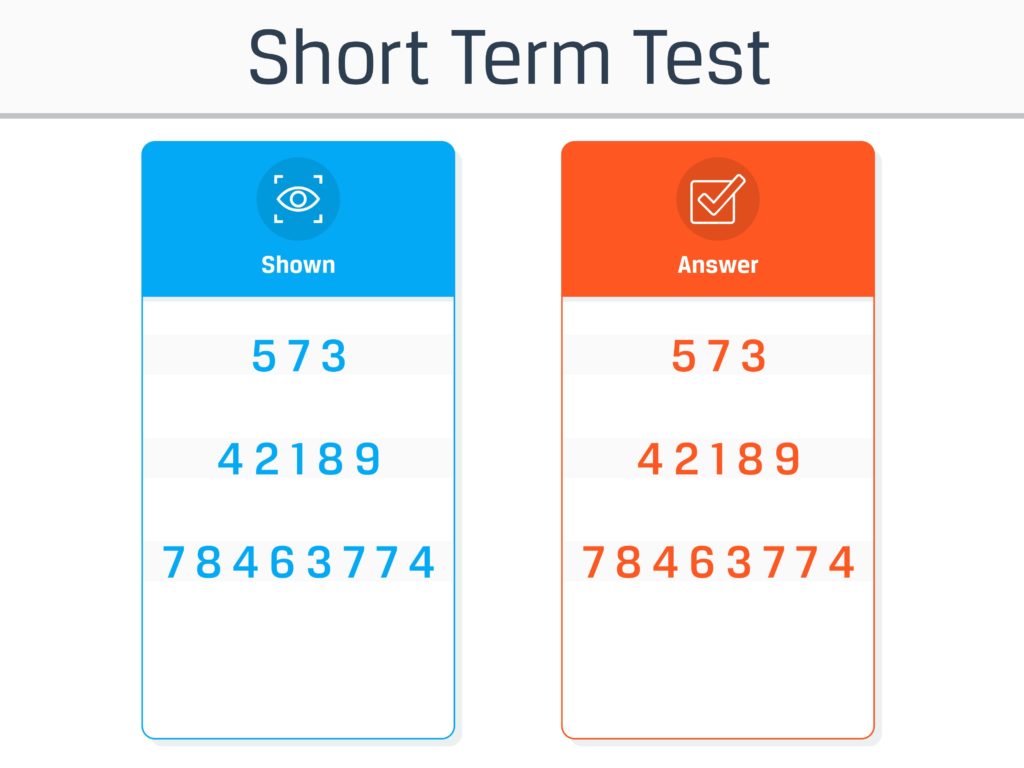
There aren't many free memory tests online. Here at Practical Psychology, we have created the first and only 3-in-1 memory test.
We built this to specifically measure your short term, long term, and working memory using a simple quiz that anyone can take in under 5 minutes.
We have thousands of people using this tool to test memory loss each month, it's a very simple and easy test to administer. If you get confused or stuck, scroll down to learn more about each type of sub-test and it's instructions!
As of right now, there have been over 250,000 people take this memory quiz, and with that, we have compiled some graphs to help students and teachers better understand where they are among the general population that takes this test. Using a memory test is a great way to actually measure and quantify something that's otherwise hard to measure throughout time.
This test consists of 5 main subtests:

Here is the overall distribution of data based on the "total score" given at the end of the test:
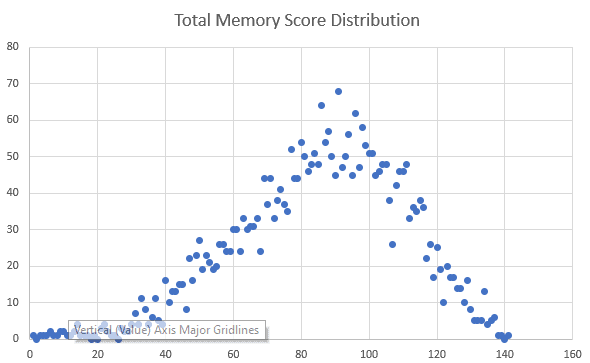
The x-axis is the score, while the y-axis is the number of scores in that range. You can see above the test results form a bell curve with a center around the score of 90. Next, let's dive into each specific category!

This form of memory usually doesn't last more than 18 seconds, unless rehearsed. The role of short-term memory is pivotal in cognitive processes like reading, problem-solving, mental arithmetic, and comprehension. For instance, when you read a sentence, you keep the beginning of the sentence in your short-term memory until you reach the end, which is vital for understanding the full context of the sentence. Similarly, mental arithmetic requires us to keep numbers in our short-term memory as we manipulate them.
Below is an image of what the user is shown during the test, along with the correct answer of each set of numbers, this is a very simple recall test.

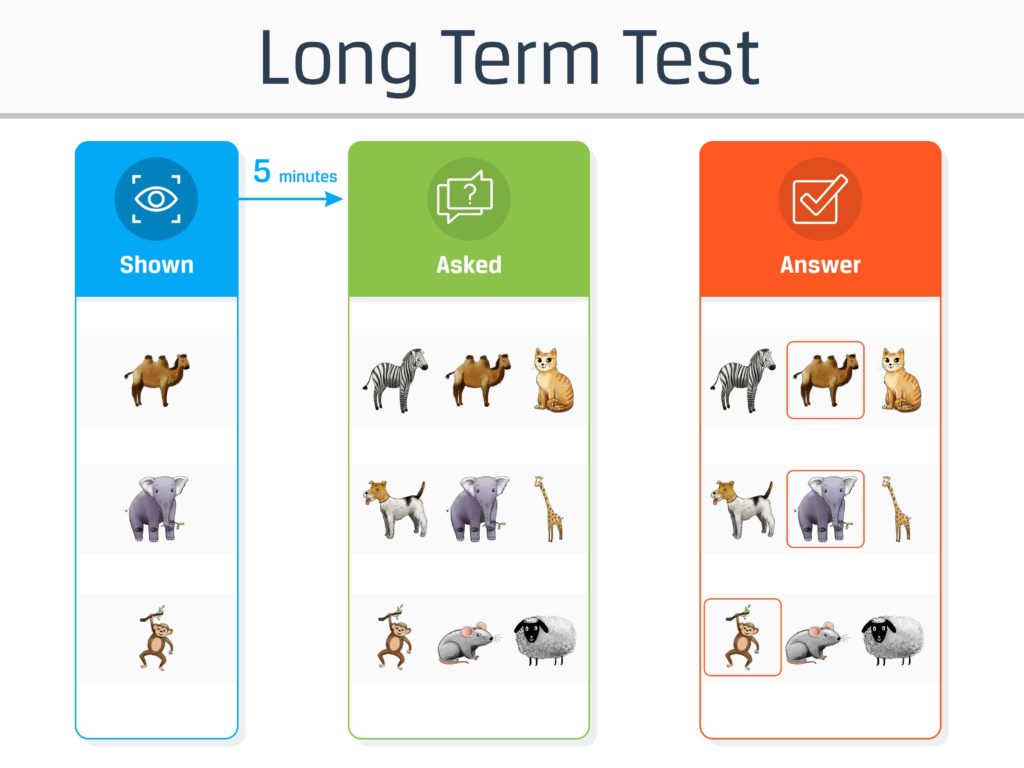
There are two types of long term memory: implicit and explicit.
Long-term memory can be divided into two main types: explicit (or declarative) and implicit (or non-declarative). Explicit memory refers to conscious, intentional recollection of factual information, previous experiences, and concepts. This category can be further subdivided into episodic memory, which pertains to personal events or "episodes", and semantic memory, which stores general world knowledge that we have accumulated throughout our life.
Implicit memory, on the other hand, is the unconscious memory of skills and how to do things. This is primarily affected by past experiences no matter how long ago those experiences occurred. Riding a bike, tying a shoe, or typing on a keyboard are examples of tasks potentially stored in implicit memory.
In this test, we are measuring the participants ability to recall their explicit memory with animal images.
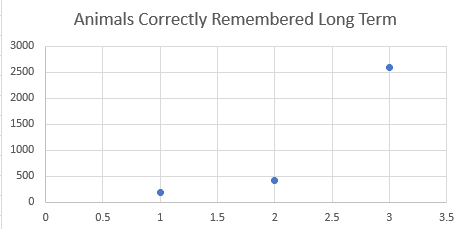
Long-term memory forms the database of knowledge that the brain draws upon to function effectively. It helps us make sense of our surroundings, understand the context of situations, and plan future actions. Our ability to learn and adapt to new experiences relies heavily on the information stored in our long-term memory.
This test may need some modifications to accurately find the limits of human memory. Right now, we are only asking you to remember 3 animals for around 5-10 minutes. It seems a majority of everyone who takes the test is able to correctly identify the original 3 animals as you can see in the data above.
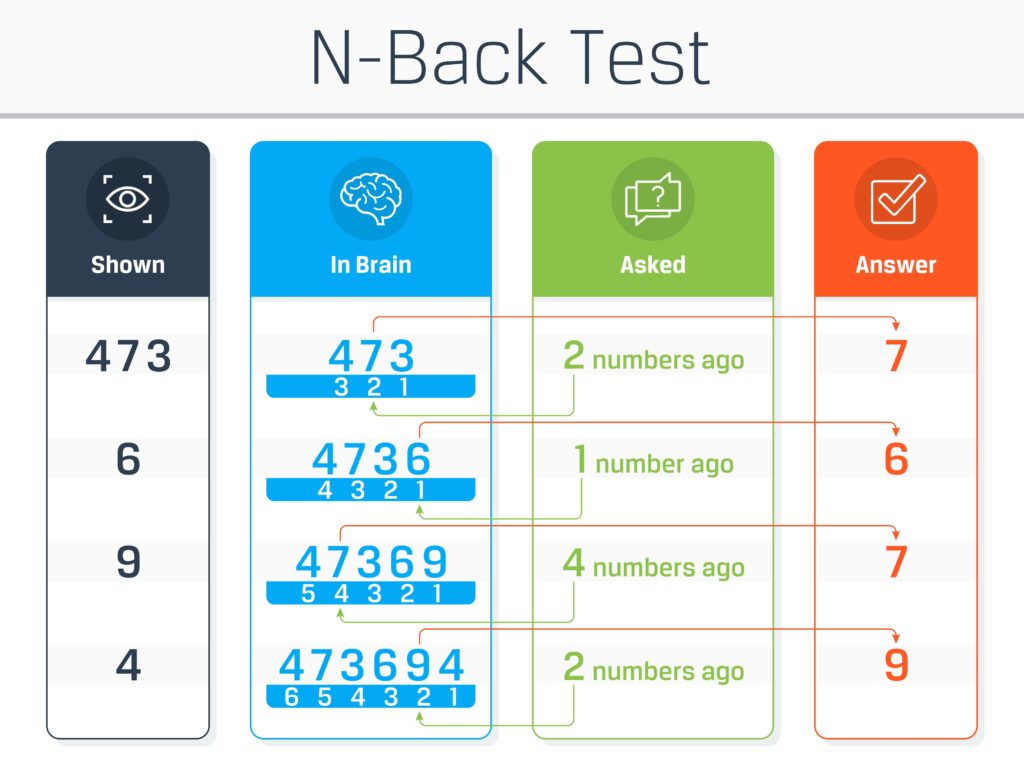
An N-Back Test is a common working memory test that may be difficult to understand if you've never heard of it before. Essentially, there will be a master list of numbers you must try to memorize. The "N-Back" part comes from the test asking you what number appeared "N" numbers ago.
For example, the test may show you "20, 34, 89" and ask you "What was the number 2 numbers ago?". The answer would be 34. Then. it will show you a new number and you have to remember the first string of numbers, plus this new number. Let's say it showed you "5". If it asked you for 2 numbers ago again, the answer would be 89.
This test is obviously a bit more difficult, and we assume that a few test-takers aren't able to understand the function. we actually get quite a few emails where people are confused, so in version 2, we'll try to make this more clear. Here is the data from a sample of 5000 test-takers:
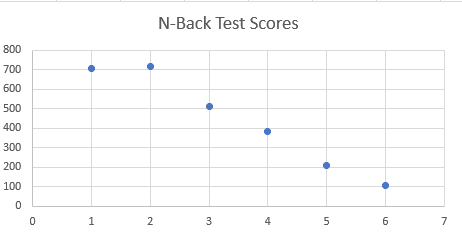
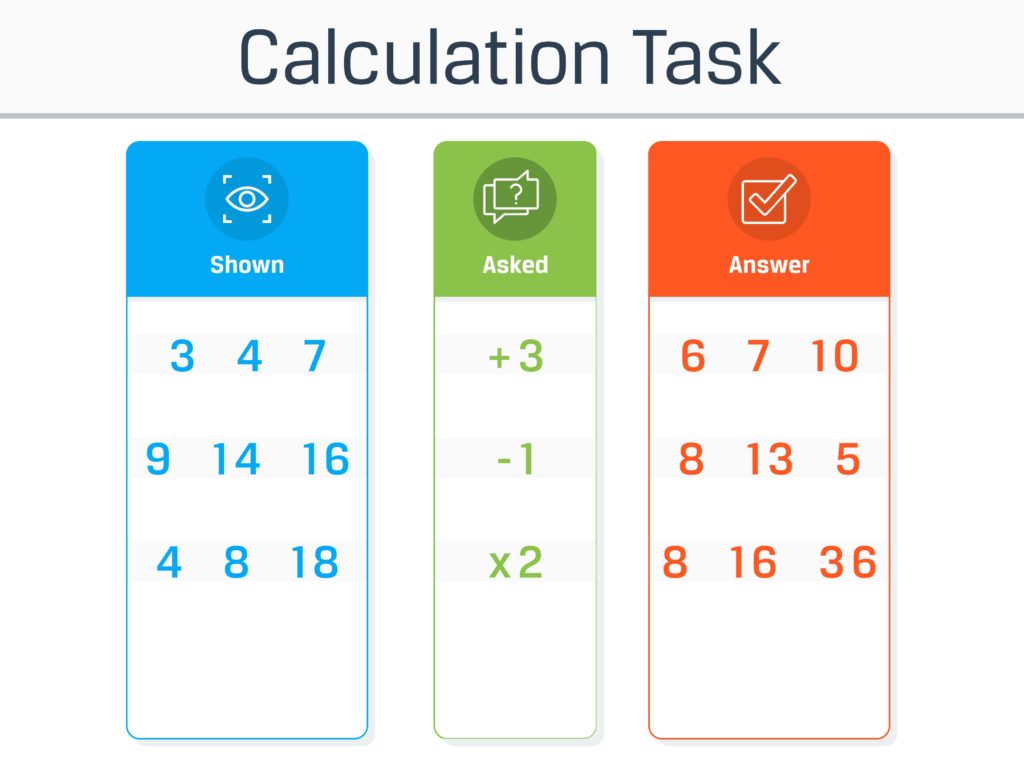
A calculation task is simple, but requires focus. First, the test will give you a few numbers. You must remember those numbers while manipulating them. For example, let's say you are given the numbers "4, 7, 9". The task is to add 4 to each number. The correct answer in this case would be "8, 11, 13".
This is a decent test, and as you can see in the data below, there is quite a nice distribution of test scores:
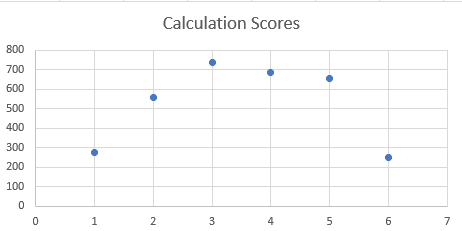
You can increase the difficulty of a calculation test by asking the participant to perform multiple calculations, using larger numbers, or more numbers.
A rotation task tests your working memory by having you perform mental rotations within your visuospatial sketchpad. Some people seem very gifted at rotating three-dimensional objections, while others struggle at this task - which shows we all have varying abilities.
We can experience memory loss in a ton of different ways. From simply forgetting where you left your car keys, to not being able to remember someone’s name, all the way through to forgetting how to get home or not recognizing family members.
Imagine you have a big box in your brain where you keep all your memories and important things you learn. Sometimes, when things get too squished and jumbled up in there, it's hard for your brain to find the things you're looking for. That's a little like what can cause memory loss.
Some things that can make it harder for your brain to remember things are when you're not feeling well, like if you're tired or sick, or when you get older. But don't worry, there are things you can do to help your brain remember better, like eating healthy foods and exercising your brain by playing memory games.
If we think of memory as a store of information that sits inside our brain. Normally, when we want to remember something, we send a signal to our brain to go find and retrieve that piece of information.
Unfortunately, sometimes this doesn’t work properly. In this sense, memory loss happens when our brain is unable to find a piece of information in that store – it’s lost or forgotten.
One of the most common causes of memory loss is age. Unfortunately, there isn’t much you can do about getting older, but we’ll be looking at things you can do to help treat age-related memory loss later on. There are other common reasons for memory loss. For the most part, these aren’t permanent and can almost always be effectively managed to get your memory back to normal.
The treatment for memory loss can vary depending on the exact cause. In most cases, where the cause is non-permanent, it might be as simple as changing the behavior that is causing your memory loss.
For example, if lack of sleep is the main reason that you’re super forgetful, you might want to try setting a routine for going to bed and getting up in the morning. For stress, anxiety, depression or an underactive thyroid, you’ll need to see a physician and get appropriate medical treatment to help.
Here are some other treatments for memory loss:
Keeping your body and mind active can really help improve your memory – or at least, slow down the effect of aging on your memory. Doing regular exercise, reading, solving puzzles or playing memory games can all really boost your mind’s ability to remember.
Memory loss due to traumatic brain injury may only be temporary, and if that’s the case, then simply rest and letting the brain heal should be enough.
However, in cases where the injury is more extensive or there is more significant damage to areas of the brain that handle learning and memory, then you will probably need to figure out a way to manage your memory problems, including:
Generally, there is no treatment for dementia-related memory loss. The extent of your memory problems will depend on which form of dementia you have and how far along it is. You can do things to help manage your condition though, in a similar way to traumatic brain injury, these include:
Eating a well-balanced diet and having regular mental and physical exercise can all help slow the progress.
Unfortunately, particularly with Alzheimer’s Disease, memory loss will only get worse as the condition progresses, and there is currently no cure.
Testing for dementia can involve a lot of different tests. This is because there isn’t always a simple blood test that tells you if you’ve got dementia. This means that often medical professionals have to resort to carrying out a few different tests and then weighing up if dementia seems likely. The following are the kind of tests you can expect, although you may only have some of these before a diagnosis of dementia is confirmed or discounted.
Cognitive tests: These tests are about trying to figure out if your general thinking skills are negatively affected. One of the most well-known tasks is the clock test, where you’re asked to draw a clock face and mark a time on it.
Neurological tests: These test more physical symptoms like balance, eye movement and reflexes. Again, these tests are complicated but will highlight if there are any issues with brain signals getting through.
Lab tests: Even if there isn’t a specific blood test for dementia, you might still have bloods taken to look for markers or other problems such as vitamin deficiencies or a thyroid problem that might explain your memory loss.
Brain scans: while scans might not necessarily help diagnose dementia, they could help discount other problems such as stroke, traumatic brain injury, and tumor that might be responsible for your memory loss. You might have a CT, MRI or PET scan.
Finally, you could have a psychiatric evaluation: This will usually focus on things like your mood and general well-being to see if your memory loss might be due to depression or other mental health condition. It’s not uncommon for you to experience depression at the same time as dementia so, even if you score as depressed, it won’t necessarily rule anything out.
In the journey of life, our memory serves as a fundamental tool, a personal history catalogue, a professional asset, and a key to learning new skills. However, like any other tool, our memory needs to be maintained and sharpened regularly to function at its best. The mind is not a static entity. it's capable of growth and adaptation, and your memory is no exception.
Memory isn't just about remembering phone numbers or recalling where you left your keys. It's a complex system involving numerous parts of the brain, and it fundamentally affects our ability to navigate the world around us. When our memory works well, it feels seamless and natural. But when it falters, it can lead to confusion, frustration, and even fear.
A critical part of this memory enhancement journey involves regularly using memory tests (like the free memory test above) to measure your progress. These tools allow you to track improvements over time and identify areas where you might be struggling. Think of them as your personal memory gym, where you can safely exercise and test your memory muscles. Here are some proven tips to help you improve your short term and long term memory:
A well-rounded approach to general health can greatly benefit your memory. Regular physical exercise increases blood flow to the brain, which can help enhance cognitive function and memory. Balanced nutrition is also essential; diets rich in fruits, vegetables, lean proteins, and healthy fats support overall brain health. In addition, ensuring you get quality sleep is vital, as this is when memory consolidation occurs, and new information is processed and stored.
Engaging in regular mental exercises can help keep your brain sharp and improve your memory. Activities that require mental effort and novelty are good choices, like puzzles, reading, writing, or playing a musical instrument. The 'use it or lose it' principle applies here - the more you work out your brain, the better you'll be able to process and remember information.
Various memory-enhancing techniques can make it easier to remember information. Mnemonics are tools that help you remember facts or a large amount of information. They can take the form of acronyms, visualizations, rhymes, or songs. For instance, you might use the acronym "ROY G. BIV" to remember the colors of the rainbow in order (Red, Orange, Yellow, Green, Blue, Indigo, Violet).
The method of loci, also known as the memory palace technique, is another effective strategy where you associate the items you're trying to remember with specific physical locations. By mentally walking through these locations, you can recall the items in order.
Maintaining an active social life can also benefit your memory. Social interactions stimulate our brains to stay agile and enhance our memory capacity. Meanwhile, chronic stress, anxiety, and depression have been linked to memory problems. Therefore, managing stress through practices like meditation, deep breathing, yoga, and other relaxation techniques can contribute to better memory health.
Lastly, never stop learning. Lifelong learning keeps the brain active and engaged, which is important for memory health. This can be in the form of formal education or informal learning like taking up a new hobby, traveling to new places, or exploring new ideas and concepts.
Reference this article: